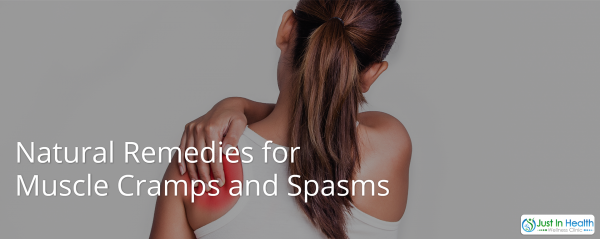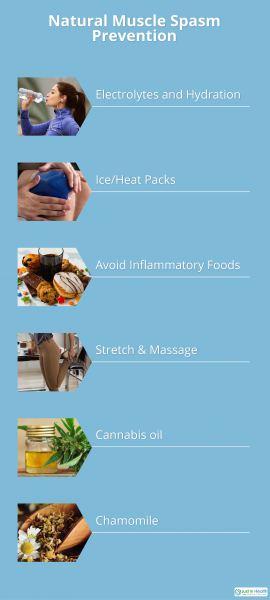

By Dr. Justin Marchegiani
Muscle cramps, spasms, charlie horses— whatever you call them, they’re no fun. When your muscles cramp or spasm, you experience pain, throbbing, and cramping that can range from a few seconds of discomfort to hours of debilitating pain. Once you understand the underlying causes and learn the natural remedies that we have to offer, we’re certain you’ll be much better equipped against unwanted muscle cramps!
Common Causes of Muscle Cramps
Muscle cramps are the sudden and involuntary contractions of your muscles and are most commonly experienced in the lower back, legs, and feet. Included in the realm of muscle cramps are Charley horses, menstrual cramps, and diarrhea aches. These random spurts of stabbing, aching, and tender pain is due to muscles that have tightened up involuntary and are unable to relax.
Muscle fatigue, or overusing your muscles, can be one way to invoke spasms. This could be from over-exerting yourself through exercise, or even just from holding the same position for too long! Age is another factor: remember, we lose muscle mass as we age, so more pressure is put on the remaining muscle. Dehydration and electrolyte deficiencies, particularly of sodium and potassium, should also be considered, as should inflammation.
Natural Muscle Spasm Prevention

Incorporate these methods of muscle spasm prevention to drastically reduce the occurrence of muscle cramps!
Electrolytes and Hydration When working out or experiencing hot weather, remaining hydrated is essential. Dehydration can lead not only to muscle cramps, but also to headaches, fatigue, and even fainting in extreme cases. Hot weather and exercise both require extra hydration, however, overhydration can also be a problem. Drinking too much liquid, or even sweating excessively, can lead to electrolyte loss. Studies have shown that electrolyte loss is the main cause of dehydration-related muscle cramps, so taking electrolytes before working out would be one great preventative measure! Try sodium, potassium, magnesium, chloride, and/or calcium.
Click here to schedule a introductory functional medicine consult to start feeling better today!
Ice/Heat Packs Hot and cold packs are both recommended for pain, and both have evidence to back up these recommendations! Researchers concluded that cold therapy reduces pain, blood flow, inflammation, muscle spasm, and metabolic demand. Heat therapy promotes pain relief and increases in blood flow, metabolism, and elasticity of connective tissues.
Avoid Inflammatory Foods Inflammation can cause muscle and joint pain by sending a misdirected immune response to these tissues. Reducing inflammation is especially helpful for women who experience painful menstrual cramps. Inflammation is often called the root of all modern diseases, which we can expand to include virtually all pain and ailments including muscle cramps and spasms. By avoiding the common culprits of inflammation (gluten, dairy, soy, sugar, alcohol, processed foods) and any personal ‘triggers’ (allergies/intolerances), you will be helping yourself prevent a lot more than just muscle cramps!
Stretch & Massage Nightly stretching of the calf and hamstring muscles just before bed was able to significantly reduce the occurrence of nocturnal leg cramps in a randomized trial.
Massaging a cramped muscle increases circulation, providing a rush of new fluid which can help relax the tense muscle.
Cannabis oil Because of the legality issues with medical marijuana, the benefits of cannabis oil have not been widely studied. However, the research that does exist on CBD (the non-psychoactive component of marijuana) is very promising. CBD has been shown to be tremendously helpful in cases of seizure and muscle spasms in infants, young children, and multiple sclerosis (MS) patients!
Chamomile has been used as a cure traditionally for centuries. It has been used as an emmenagogue (stimulates menstruation) and a uterine tonic for women and is effective in reducing symptoms of arthritis, back pain, seizures, and cramps. Chamomile is also anti-inflammatory!
Takeaway
Over-the-counter drugs shouldn’t be a part of your action plan in defeating muscle cramps; these medicines don't actually fix the problem, they just mask the symptoms. In fact, drugs for muscle cramps and spasms actually work on the nervous system, not the muscular system! Plus, they affect your whole body, not just the muscles that are cramping. This can lead to brain fog and all sorts of negative side effects.
Most muscle spasms are harmless, just uncomfortable. These unwanted spasms can be prevented naturally, and there are even natural methods for immediate relief that are totally safe and effective! If you’re suffering from severe muscle cramps that are negatively affecting your life, talk to a doctor to see if there might be an underlying cause.
References:
https://www.ncbi.nlm.nih.gov/pmc/articles/PMC1150229/
https://www.ncbi.nlm.nih.gov/pubmed/22341378
https://www.ncbi.nlm.nih.gov/pubmed/25526231
https://www.ncbi.nlm.nih.gov/pubmedhealth/PMH0048475/
https://www.ncbi.nlm.nih.gov/pmc/articles/PMC2995283/
https://www.ncbi.nlm.nih.gov/pmc/articles/PMC5377971/
https://www.ncbi.nlm.nih.gov/pmc/articles/PMC5594245/
https://www.ncbi.nlm.nih.gov/pmc/articles/PMC3665015/